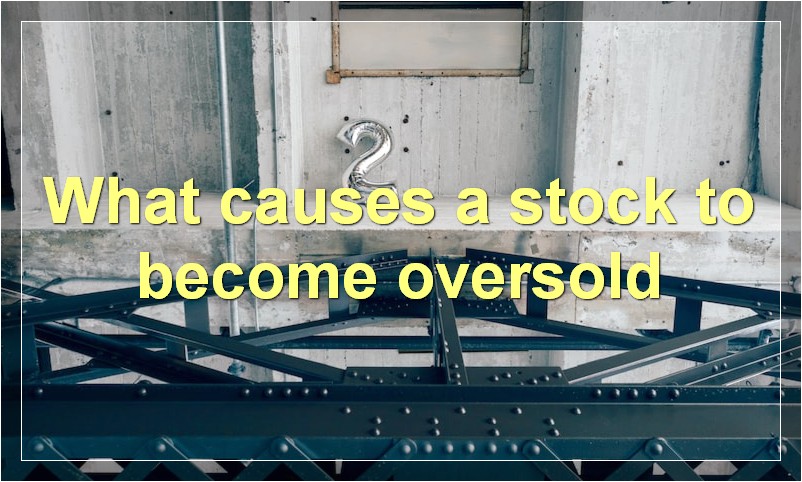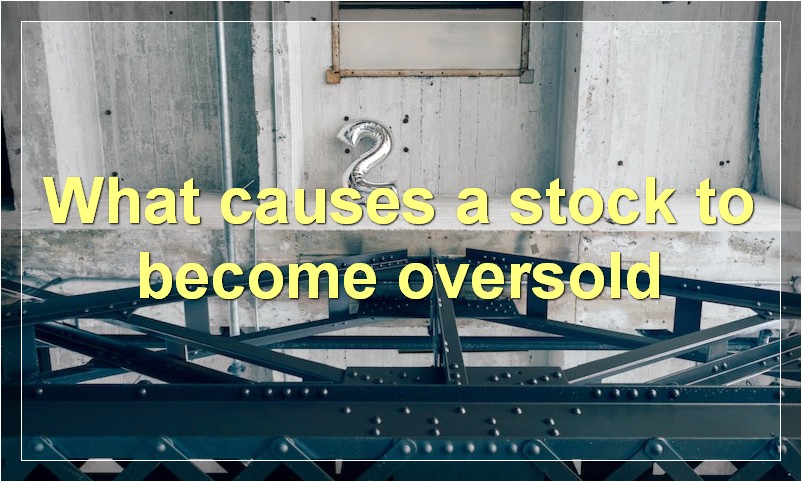1. Oversold stocks are often undervalued by the market and can be a great investment.
2. A stock becomes oversold when it is trading at a lower price than its fundamental value.
3. You can tell if a stock is oversold by looking at its price-to-earnings ratio, price-to-book ratio, and other valuation metrics.
4. The implications of owning an oversold stock depend on the company’s financial health and the overall market conditions.
5. It is wise to buy an oversold stock if you believe the market has misunderstood the company’s true value.
6. You should sell an oversold stock if the company’s fundamentals have changed or if the market conditions are no longer favorable.
7. The definition of an oversold market is a market where prices have fallen significantly from recent highs.
8. An overbought stock is a stock that is trading at a higher price than its fundamental value.
9. The difference between an oversold and overbought stock is that an oversold stock is undervalued by the market while an overbought stock is overvalued by the market.
10. You can trade an oversold stock by buying it when the price is low and selling it when the price rises back to its fundamental value.
What is an oversold stock
An oversold stock is a stock that has been sold off more than is warranted by the underlying fundamentals. This can happen for a variety of reasons, including investor fears about the company’s prospects, or simply because the stock got ahead of itself and became too expensive relative to earnings. Oversold stocks often rebound sharply as investors realize that the sell-off was overdone.
For example, let’s say that ABC Corporation is a well-established company with a strong track record of profitability. However, ABC’s stock price falls sharply one day on no news. This could be due to investors’ concerns about the future of the overall economy, which leads them to sell off ABC’s stock even though the company itself is doing well. After the initial sell-off, other investors see ABC as being undervalued and start buying it up, leading to a sharp rebound in the stock price.
If you’re interested in finding oversold stocks, there are a number of technical indicators that can be used. The most popular is the Relative Strength Index (RSI), which measures how overbought or oversold a stock is based on recent price changes. A stock is considered oversold when the RSI falls below 30, and it can be a good idea to buy when this happens.
Of course, just because a stock is oversold doesn’t mean it’s a surefire winner. You’ll still need to do your own research to decide if a particular stock is a good investment. But if you find an oversold stock that you believe in, it can be a great way to make money in the market.
What causes a stock to become oversold

When a stock becomes oversold, it means that the demand for the stock is low and there are more sellers than buyers. This can happen for a number of reasons, including bad news about the company, a general sell-off in the market, or simply because investors are taking profits after the stock has had a run-up in price. Oversold stocks often attract bargain hunters who believe they can buy the stock at a discount and then sell it later for a profit.
How can you tell if a stock is oversold
When looking at whether a stock is oversold, there are a few indicators you can use. The first is the Relative Strength Index (RSI), which measures how overbought or oversold a stock is. A stock is considered oversold when the RSI is below 30. Another indicator you can use is the Stochastic Oscillator, which measures momentum. A stock is considered oversold when the stochastic oscillator is below 20. Finally, you can look at Bollinger Bands. These are bands that show volatility and act as support and resistance levels. A stock is considered oversold when it falls below the lower Bollinger Band.
What are the implications of owning an oversold stock
When a stock is oversold, it means that it has been sold more than what buyers are willing to pay for it. This can happen for a variety of reasons, but usually happens when investors are worried about the future prospects of the company. If you own an oversold stock, it’s important to watch for any news or changes in the company that could impact its future. If the company’s prospects improve, the stock price is likely to go up. However, if the company’s outlook deteriorates, the stock price is likely to fall.
Is it wise to buy an oversold stock
When a stock is oversold, it means that it has been sold off more than what is warranted by the underlying fundamentals. This can happen for a variety of reasons, including a general sell-off in the market, or specific news about the company that has investors worried. Oversold stocks can be a bargain if the selling is overdone and the stock is actually undervalued. However, there is always a risk that the stock will continue to fall if the underlying problems are not resolved. As such, investing in oversold stocks should only be done with careful consideration and after doing thorough research.
Should you sell an oversold stock

If you’re thinking about selling an oversold stock, there are a few things you should consider first.
For starters, it’s important to understand what an oversold stock is. An oversold stock is a security that has been sold at a higher price than what the current market conditions warrant. In other words, it’s a stock that’s being traded for more than it’s actually worth.
This can happen for a number of reasons. Maybe investors are getting nervous about the company’s financial prospects and are selling off their shares. Or, maybe there’s been some negative news about the company that’s caused the stock price to drop.
Whatever the reason, an oversold stock is one that you might want to think twice before selling. That’s because when a stock is oversold, it means that there’s more downside risk than upside potential. In other words, the stock could go down even further in price.
Of course, there are exceptions to every rule. Sometimes, an oversold stock can be a great opportunity to buy low and sell high. But, generally speaking, you should be cautious when selling an oversold stock.
What is the definition of an oversold market
An oversold market is a market where selling has exceeded buying and prices have decreased as a result. This can happen for a variety of reasons, such as economic news that causes investors to sell, or simply because more people want to sell than buy. When the market is oversold, it is often seen as a good time to buy, as prices are likely to go back up.
What is an overbought stock
An overbought stock is a stock that has been bought by too many investors and is now overvalued. This can happen when a company’s share price goes up too quickly and becomes higher than what the company is actually worth. Overbought stocks are often seen as a red flag by investors and can be a sign that a stock market bubble is about to burst.
What is the difference between an oversold and overbought stock
When a stock is oversold, it means that it has been sold off more than what is warranted by the underlying fundamentals. This can happen for a variety of reasons, such as when investors are panicking about a potential market downturn. Oversold stocks are often seen as being undervalued, which can make them attractive to investors looking for a bargain.
On the other hand, overbought stocks have been bought up more than what is justified by the underlying fundamentals. This can happen when investors are overly optimistic about a company’s prospects. Overbought stocks are often seen as being overvalued, which can make them less attractive to investors.
How do you trade an oversold stock
When a stock becomes oversold, it means that it has been sold off more than what is warranted by the underlying fundamentals. This can happen for a number of reasons, including investor fear or simply because the market is overreacting to news. Whatever the reason, an oversold stock presents an opportunity for savvy investors.
There are a few ways to trade an oversold stock. One is to wait for the price to bounce back up to its previous level, at which point you can buy in. Another is to wait for the price to bottom out and then start buying when it starts to move back up.
The key with trading oversold stocks is to be patient and wait for the right opportunity. If you jump in too early, you could get burned; but if you wait too long, you could miss out on a great opportunity.

